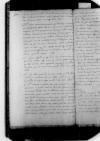List #5741
Alfonso de VALDÉS do Ioannes DANTISCUS[Granada], [1526-09-18 — 1526-10-11]
Regest polski: Valdes dziękuje Dantyszkowi za przesłanie hymnu, którego lektura była dla niego wytchnieniem w ciężkiej pracy. Obiecuje własnoręcznie przepisać tekst i spalić egzemplarz przesłany przez Dantyszka. Ubolewa, że kanclerz [Mercurino Gattinara], w związku z odesłaniem części sług do Italii, przydzielił mu tak wiele zajęć, że nie zdoła niestety spotkać się teraz z Dantyszkiem.
Rękopiśmienne podstawy źródłowe:
Pomocnicze podstawy źródłowe:
Publikacje:
| ||||||||||||||||||||
Tekst + aparat krytyczny + komentarz Zwykły tekst Tekst + komentarz Tekst + aparat krytyczny
Salutem plurimam.
Deum immortalem, quantum ego tibi debeo, mi Dantisce, qui molestissimis negotiis obrutum recreas novis subinde print 1 deliciis,
ms 1 delicii[s] hidden by binding,
ms 2 deliciis⌈deliciisprint 1 deliciis,
ms 1 delicii[s] hidden by binding,
ms 2 deliciis⌉. Numquam, mehercle, quicquam hoc tuo hymno[1] vidi rectius accommodatum.
Amanuensi[2] non committam, sed print 1 meapte,
ms 1 2 mea propria⌈meapteprint 1 meapte,
ms 1 2 mea propria⌉ manu descriptum, quem
print 1 misisti,
ms 1 meristi,
ms 2 misisti⌈misistiprint 1 misisti,
ms 1 meristi,
ms 2 misisti⌉, igni tradam. Ceterum tu
ipse print 1 facile,
ms 1 2 omitted⌈facileprint 1 facile,
ms 1 2 omitted⌉
conicere potes, quam sit mihi molestissimum, quod dulcissima tua
print 1 consuetudine,
ms 1 con[sue]tudine hidden by binding,
ms 2 consuetudine⌈consuetudineprint 1 consuetudine,
ms 1 con[sue]tudine hidden by binding,
ms 2 consuetudine⌉ mihi frui non liceat.
ms 1 2 onerat⌈enecatprint 1 enecat,
ms 1 2 onerat⌉
atque ita huic print 1 domui,
ms 1 do[mui] hidden by binding,
ms 2 domo⌈domuiprint 1 domui,
ms 1 do[mui] hidden by binding,
ms 2 domo⌉
alligavit, ut hinc discedere fas non sit. Forsan aliquando print 1 miseris,
ms 1 miseri[s] hidden by binding,
ms 2 miseris⌈miserisprint 1 miseris,
ms 1 miseri[s] hidden by binding,
ms 2 miseris⌉
feliciora print 1 sequentur,
ms 1 sequuntur,
ms 2 sequentur⌈sequenturprint 1 sequentur,
ms 1 sequuntur,
ms 2 sequentur⌉ tempora.
Vale.
print 1 Tuus Valdesius,
ms 1 2 omitted⌈Tuus
ms 1 2 omitted⌉

 BK 222, p. 201
BK 222, p. 201